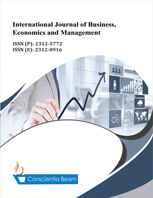Foreign Capital Inflows and Unemployment in Nigeria: A New Evidence from ARDL-Bounds Testing Approach
DOI:
https://doi.org/10.18488/journal.62.2018.56.176.188Abstract
Using a novel approach, this study disaggregates and estimates the impact of foreign capital inflows on unemployment in Nigeria by adopting the Auto-Regressive Distributed Lag- Unrestricted Error Correction Methodology (ARDL-UECM). The ARDL-bounds test co-integration results show evidence of co-integration between disaggregated Foreign Capital Inflow variables (such as Foreign Direct Investment, Foreign Portfolio Investment and Remittances) and unemployment rate in Nigeria within the period from 1977Q1 – 2013Q4. The empirical results also show that foreign direct investment, foreign private investment and trade openness have negative impact on unemployment rate. On the other hand and interestingly, remittances and real exchange rate show a positive impact. The study therefore recommends the routing of remittances through the banking channels which would help in allocating remittances and other financial flows to productive uses. Again, government should enact investor-friendly policies and build conducive business environment in order to attract more Foreign Capital Inflows which will support job creation for the teeming population and thereby reduce biting unemployment.

